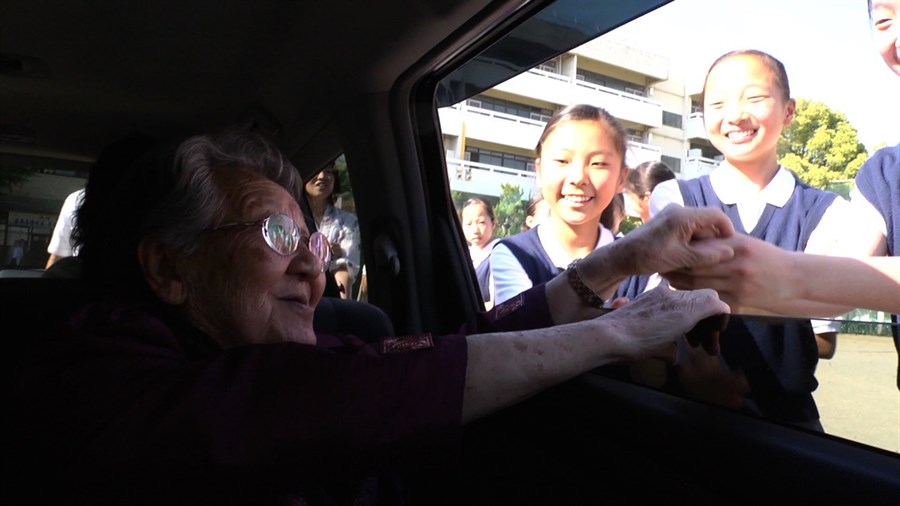2016 Hot Docs ‘The Apology’

The Apology (2016) written and directed by Tiffany Hsiung, is a poignant and emotionally moving documentary that narrates the stories of three elderly Asian women who as young girls were forced into sexual slavery by the Japanese Imperial Army during the Second World War. Their stories shine a light on Japan’s ugly military past and its failure to account for the war crimes committed by the Japanese Imperial Army, an instrument of the Japanese state. More than two hundred thousand women and girls from China, Korea, The Philippines, Taiwan, Indonesia and many other Asian and South Pacific countries including female prisoners of war from Allied nations captured by the Japanese were forced to work as sex slaves in the Japanese Imperial Army “comfort system”. Survivors are still seeking justice, and the film documents the extraordinary efforts of one of the three elderly women, Grandma Gil, whose quest for an apology knows no limits.
The film opens with an aerial shot that pans across a breathtaking landscape of rice terraces cut from the slopes of mountains stretching into an infinite horizon. It’s a visually stunning image and I saw it as a metaphor of the reach of the Imperial Japanese Army before and during the Second World War which was indeed far and wide in its military pursuits to conquer the Asian continent for Japan’s own selfish reasons.
The film continues with snapshots of the film’s three main characters, Grandma Cao in China, followed by Grandma Adela in the Philippines, and finally, Grandma Gil in South Korea. Much information is gleaned in these brief snapshots, but more importantly, their juxtaposition is significant. Grandma Cao and Grandma Adela are shown in the privacy of their homes starting their day as opposed to Grandma Gil, who accompanied by a supporter, is seated on a bus singing a Korean song. Close ups reveal their frailty and a close up of Grandma Cao’s tiny feet reveals her feet were broken and bound as a young child.
During a 2010 Tokyo demonstration attended by Grandma Gil, the filmmaker captures one of the most disturbing images in the film. As Grandma Gil together with another survivor and their supporters move past a guarded checkpoint, Japanese protestors on the other side of the checkpoint holding Japanese flags, hurl verbal abuses at them. Talk about blaming the victim for the abuse but this blatant example of negating their victimization at the hands of the Imperial Japanese Army reveals much about Japan, and its denial of its ugly military past. Having lived in Japan and taught in the Japanese educational system, I discovered many Japanese are ignorant of their country’s military past during the Second Sino-Japanese War and Second World War, and Japanese students are not fully taught their country’s history which the film reveals.
The filmmaker creates intimate portraits of her three main characters, and you not only feel the pain, shame, suffering and hardship these three women have endured because of their sexual enslavement but come to understand how it coloured and changed their lives. Grandma Cao’s backstory is revealed through first person interviews including interviews with neighbours, her adopted daughter who didn’t know, Grandma Cao’s sister, and with Zhang Shaun Bing, author of “Women in the Comfort Station”. Bing tells us that survivors like Grandma Cao couldn’t speak out because nobody would listen and so, they kept silent. Talk about adding insult to injury. More importantly, Bing says, “there is no historical record about these female victims. If we resolve this, we can address the omission in history books.” Furthermore, he tells us that Grandma Cao is only one of three survivors remaining. For Grandma Gil, who denied her past and came out late, she says, “she is the only one left to do this work.” An apology would heal her heart but not the scars she carries, and at 86 years old, she says, she hasn’t much time left to wait. You do feel that she is the only left to do the work, and I was left in awe of her tireless efforts to educate and seek an apology. For Grandma Adela, who tells her own story, shame prevented her from coming out into the open. Her father and husband never knew what happened to her, and, in the end, she finds the courage to tell her adult children.
Will these three brave courageous women ever see the light of justice? The documentary begs many questions. If Germany can atone for and reconcile its sordid Nazi past, why not Japan? If the Japanese government won’t apologize, why don’t they tell the truth at least?
The Apology is a powerful film that documents the moving stories of three elderly women who as young girls were forced against their will to work as sex slaves for the Japanese Imperial Army and shines a light on Japan’s refusal to atone for its war crimes. It is well written and directed and deserving of your attention.
The Apology will be playing at various theatres:
TIFF Bell Lightbox 1 on May 1 @ 10:30 a.m.
Isabel Bader Theatre on May 8 @ 12:45 p.m.
Hart House Theatre on May 8 @ 6:30 p.m.
Tickets can be purchased here!

